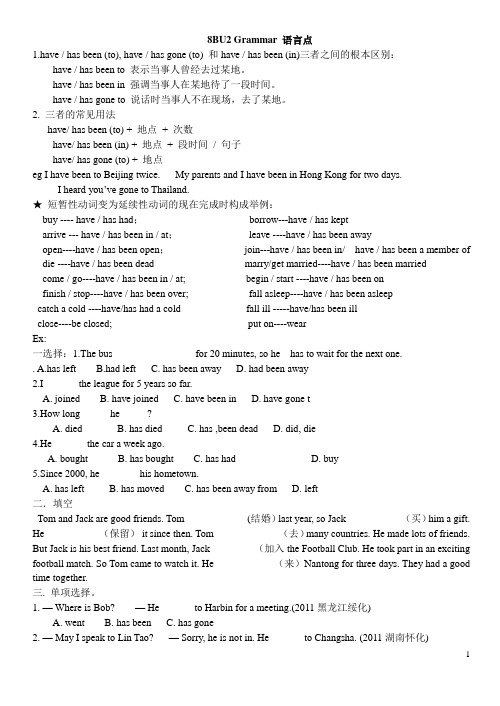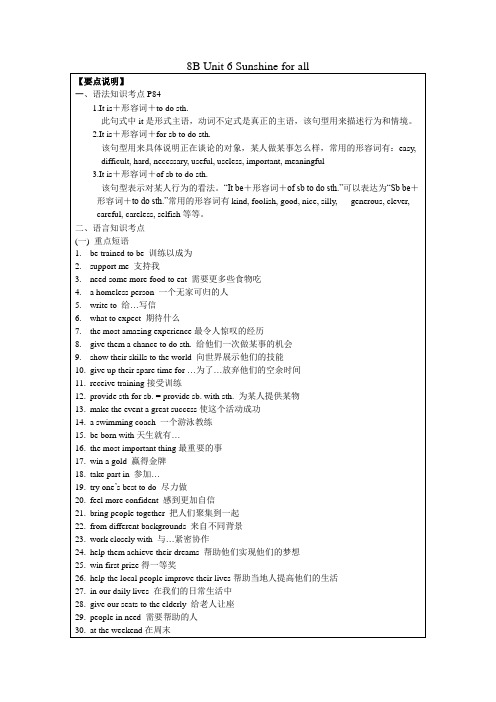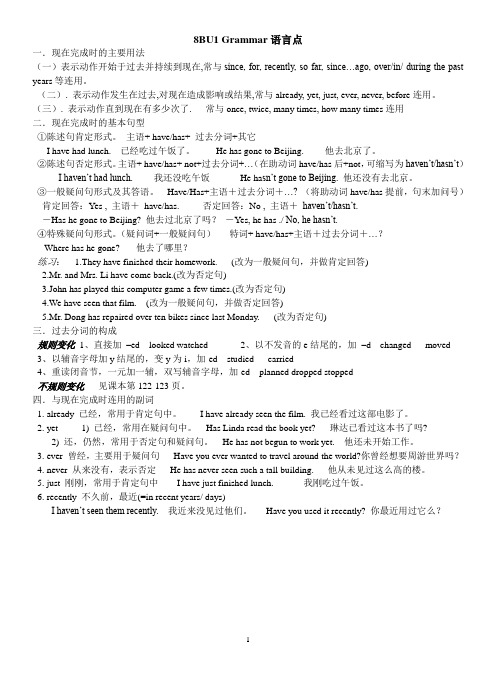八年级下册英语(苏教版八年级)8BU6-Grammar-语言点教学内容
(完整版)八年级下册英语(苏教版八年级)8BU2Grammar语言点

8BU2 Grammar 语言点1.have / has been (to), have / has gone (to) 和have / has been (in)三者之间的根本区别:have / has been to 表示当事人曾经去过某地。
have / has been in 强调当事人在某地待了一段时间。
have / has gone to 说话时当事人不在现场,去了某地。
2. 三者的常见用法have/ has been (to) + 地点+ 次数have/ has been (in) + 地点+ 段时间/ 句子have/ has gone (to) + 地点eg I have been to Beijing twice. My parents and I have been in Hong Kong for two days.I heard you’ve gone to Thailand.★短暂性动词变为延续性动词的现在完成时构成举例:buy ---- have / has had;borrow---have / has keptarrive --- have / has been in / at;leave ----have / has been awayopen----have / has been open;join---have / has been in/ have / has been a member of die ----have / has been dead marry/get married----have / has been marriedcome / go----have / has been in / at; begin / start ----have / has been onfinish / stop----have / has been over; fall asleep----have / has been asleepcatch a cold ----have/has had a cold fall ill -----have/has been illclose----be closed; put on----wearEx:一选择:1.The bus ________________for 20 minutes, so he has to wait for the next one.. A.has left B.had left C. has been away D. had been away2.I ______ the league for 5 years so far.A. joinedB. have joinedC. have been inD. have gone t3.How long _____ he _____?A. diedB. has diedC. has ,been deadD. did, die4.He ______ the car a week ago.A. boughtB. has boughtC. has hadD. buy5.Since 2000, he _______ his hometown.A. has leftB. has movedC. has been away fromD. left二.填空Tom and Jack are good friends. Tom ____________(结婚)last year, so Jack ___________(买)him a gift. He ___________(保留)it since then. Tom ____________ (去)many countries. He made lots of friends. But Jack is his best friend. Last month, Jack _________(加入the Football Club. He took part in an exciting football match. So Tom came to watch it. He___________ (来)Nantong for three days. They had a good time together.三. 单项选择。
八年级下册英语(苏教版八年级)8BU2Reading 语言点

8BU2 Reading 语言点1.去香港旅行take/ have/ go on a trip to Hong Kong2. 去香港度假go on holiday in Hong Kong; have/take a holiday in HK; go to Hong Kong on holiday; go to HK for a holiday; go to HK to spend the holiday;3. We __________(not see) each other since last week. We _________(not see) each other for a week. We haven’t seen each other _________ a week ago.We _______(see) each other about a week ago. We haven’t seen each other ________ a week .4. I miss you so much! miss vt. ①想念,思念; ②错过,没做到其后接名词,代词或doing③ be/ go missing= be/get lost 失踪的,丢失的① Dave非常想念他的爷爷奶奶。
Dave misses his grandparents very much.我会怀念和你一起工作的日子。
I will miss working with you.② Mona非常伤心,因为她错过了火车。
Mona was sad because she missed her train.我不想错过今晚在电视上看那部影片I don’t want to miss seeing that film on television tonight.你昨晚错过了一场很棒的聚会。
You missed a good party last night.我们迟到了,错过了电影的开头。
八年级下册英语(苏教版八年级)8BU4Reading语言点讲课稿

八年级下册英语(苏教版八年级)8BU4Reading语言点讲课稿8BU4Reading语言点1. After our ship crashed against/ into the rocks, I swam as far as I could.(1)against(prep) 表示“紧靠;碰,撞”,后接名词、代词、V-ing形式等作宾语。
他的自行车撞到岩石上,伤了腿。
His bike crashed against the rock, so he hurt his leg.墙边紧靠着一辆自行车。
There is a bike against the wall. 雨点打在窗户上。
The rain beat against the window. 把桌子靠着墙放put the desk against the wall 把自行车靠着树放put the bike against the tree斜靠着讲台站着lean against the teacher’s desk把脸贴在窗户上put one’s face against the window against 还可以表示“反对”。
(be against/ be for赞成)Are you against it or for it? 你对此事是反对呢还是赞成?(2)as+adj./adv.+as I can=as+adj./adv.+…as possible“尽可能地……”我们应该尽可能地多说英语。
We should speak English as often as we can.=We should speak English as often as possible。
请设法尽快完成这项工作。
Please try to finish the work as soon as you can.他妈妈尽量照顾好他。
His mother looked after him as well as she could. 我会尽快赶过来、I will come as quickly as I can. as far as I know 据我所知2. By the time I finally felt the land under my feet, I was tired out.(1)by the time 到……时候为止,直到……时候注意:当从句用一般过去时,主句常用过去完成时;但如果主句中的动词是be时,则往往不用完成时。
苏教版八年级英语下册 Unit 6 知识点

【知识建构】We use “ It’s + ____________________________”to express what we think about something. We use “ It’s + ____________________________”to specify who we are talking about.We use “ It’s + ____________________________”to express what we think of someone’s actions.1.Can you make sentences with “It is+形容词+to infinitive.” ?2.Can you make sentences with “It is+形容词+for …+ to infinitive.” ?3.Can you make sentences with “It is+形容词+of …+ to infinitive.”?【典例精讲】1. It’s kind __________you to give me a hand whenever I am in trouble.A. ofB. forC. toD. with本题考查两个句式的比较:It’s +adj. + for sb. to do sth 和It’s + adj. + of sb. to do sth。
重点关注for 和of的区别。
当句式中的adj修饰人的品格,个性时,常选用of;当句式中的adj. 修饰后面的不定式时,选用for。
句意:无论我何时有困难,你都给我帮助,你真好。
kind是修饰人,故选A。
2. It was really helpful___________him to take the cat to the animal centre_______ a rainy night.A. of; onB. of; atC. for; onD. for; at同上,helpful修饰人,排除C、D。
八年级下册英语(苏教版八年级)8BU1 Grammar语言点

8BU1 Grammar语言点一.现在完成时的主要用法(一)表示动作开始于过去并持续到现在,常与since, for, recently, so far, since…ago, over/in/ during the past years等连用。
(二). 表示动作发生在过去,对现在造成影响或结果,常与already, yet, just, ever, never, before连用。
(三). 表示动作直到现在有多少次了. 常与once, twice, many times, how many times连用二.现在完成时的基本句型①陈述句肯定形式。
主语+ have/has+ 过去分词+其它I have had lunch. 已经吃过午饭了。
He has gone to Beijing. 他去北京了。
②陈述句否定形式。
主语+ have/has+ not+过去分词+…(在助动词have/has后+not,可缩写为haven’t/hasn’t)I haven’t had lunch. 我还没吃午饭He ha sn’t gone to Beijing. 他还没有去北京。
③一般疑问句形式及其答语。
Have/Has+主语+过去分词+…?(将助动词have/has提前,句末加问号)肯定回答:Yes , 主语+have/has. 否定回答:No , 主语+haven’t/hasn’t.-Has he gone to Beijing? 他去过北京了吗?-Yes, he has ./ No, he hasn’t.④特殊疑问句形式。
(疑问词+一般疑问句)特词+ have/has+主语+过去分词+…?Where has he gone? 他去了哪里?练习: 1.They have finished their homework. (改为一般疑问句,并做肯定回答)2.Mr. and Mrs. Li have come back.(改为否定句)3.John has played this computer game a few times.(改为否定句)4.We have seen that film. (改为一般疑问句,并做否定回答)5.Mr. Dong has repaired over ten bikes since last Monday. (改为否定句)三.过去分词的构成规则变化1、直接加–ed looked watched 2、以不发音的e结尾的,加–d changed moved3、以辅音字母加y结尾的,变y为i,加-ed studied carried4、重读闭音节,一元加一辅,双写辅音字母,加-ed planned dropped stopped不规则变化见课本第122-123页。
八年级下册英语(苏教版八年级)8BU6Welcome语言点

八年级下册英语(苏教版八年级)8BU6Welcome语言点8BU6 Welcome语言点1. I’m training to be a volunteer for the Olympic Games.train v.训练;培训(trainer)train to be a …for sth 接受做某事的训练train to be a volunteer for the Olympics他正在接受医生/ 教师培训。
He is training to be a doctor/ teacher.你要刻苦训练就能成为优秀的足球运动员。
If you train hard, you'll make a good footballer.2. Will you support me, Eddie? 你会支持我吗?(1) support v.支持,支撑你会支持我的决定吗?Will you support my decision?这座桥经得起重卡车通行。
The bridge is strong enough to support heavy trucks.希望你在我们需要帮忙时,能给我们以帮助。
Hope you can support us when we are in trouble.如果你在会议上提出这个问题,我将支持你。
If you raise this question at the meeting, I’ll support you.(2)v. 维持,供养他有一大家子要供养。
He has a large family to support. (He has to support a large family.)(3) n.支持,不可数名词。
我需要你的支持。
I need your support.常用在下列短语中:with / without the support of “在……的支持下”;with one’s support “在某人的支持下”。
八年级下册英语(苏教版八年级)8BU4 Grammar 语言点
8BU4 Grammar 语言点Grammar I:疑问词+to-infinitive (疑问词+动词不定式)一.疑问词+动词不定式疑问词: 可以是所有的疑问词(除why外)二. 常和此结构连用的动词及动词短语有:know, learn, see, hear, ask, tell, decide, explain, find out, forget, remember, understand 等。
三. “疑问词+动词不定式” 结构可以改写成由该疑问词引导的从句。
I don’t kn ow what to do.= I do not know what I should do.四. 这种结构在句中可以做宾语,主语和表语.五.有些疑问词,如what, which, whose, how many, how much等,其后可以先接一个名词,再接动词不定式。
I don’t know which topic to choose. 我不知道选哪个题目。
在“疑问词+ 动词不定式”结构前,有时也可以是如sure, clear等的形容词。
I am not sure which way to take. 我不确定走哪条路。
六. 疑问词+to do sth +介词注意:who to look after what to write with七. 疑问词引导的宾语从句(从句要用陈述句语序)What do you think of the book? I don’t know what you think of the book.Grammar II must; have to一. must 肯定和否定形式must 表主观的义务和必要,主要用于肯定句和疑问句,“必须,得,要”。
must 的否定形式must not (mustn’t)表示禁止,“不能,不行,不可以”。
e.g. You must finish your homework today. 你今天必须完成家庭作业。
江苏省八年级英语下册 Unit 6 Sunshine for all Grammar 3课件
描述人
It is kind of Amy to give seats to the elderly.
=__A_m__y_ is kind _to__g_iv_e__s_ea_t_s_t_o__th_e__e_ld_e_r_l_y.
wrong
park
It is kin of the young mantodonate blood to people in need . d
not right
It is impolite ofthe
bad
man
to smoke in public places.
It'swrong of the people todrop litter everywhere. bad
If I can be a volunteer, I think it is...for/of...to...
Where there is love,
there is hope.
Homework
1. Review what we have learnt today. 2. Write a short article about what we
(necessary/parks/clean/ keep)
No pictures for you!
Try to make up a sentence by yourself.
Grammar B
It is necessary to do homework. It is necessaryfor all of us to do homewor
译林牛津版英语八年级下册(8B)Unit6 Sunshine for all Grammar课件
பைடு நூலகம்
Good or bad?
3. wrong/it is/of/drop litter/to/the people/ everywhere _It__is_w__r_o_n_g_o_f_t_h_e__p_e_o_p_le__to____________ _d_r_o_p_l_it_t_er__e_v_e_ry_w__h_e_r_e_. ______________
important more trees.
It is
to plant
donate give help keep plant take care of 6
necessary parks clean.
It is
to keep
Work out the rule
It is meaningful for Amy to help society.
Good or bad?
It is ...of...to..., because ...
Who is your favourite?
It’s + adjective+ of ... + to-infinitive
Have a PK
60 55 44 33 22 16 12 10 8 7 6 5 4 3 2 1 0 准备 开始
4. of/kind/it is/to/donate blood/the young man/to people in need I_t_i_s_k_i_n_d_o_f__th_e__y_o_u_n_g_m__a_n__to__________ d_o_n_a_t_e__b_lo_o_d__to__p_e_o_p_l_e_i_n_n_e_e_d_.________
牛津译林版英语 八年级下册 8B Unit 6 Grammar教案
to win the competition.
possible
her
to work for the charity on Saturday.
for引出逻辑主语
2.Present the table on Page 85.
Asking about the volunteer work
Simon is a volunteer now. He works for people with intellectual disabilities. Amy is asking him about his work. Complete their conversation with the phrases in the box.
2.Ability objectives:
(1) Touse structre to make sentences
3.Value objectives:
(1) To develop students’ rightvalues and to be kind to all the people
Teachingkeypoints and difficult points:
你能为需要帮助的人做些事情真的很善良。
We can useIt is + adjective + of... + to-infinitiveto express what we think of someone's actions.
It is
adjective
of
someone
to-infinitive
Teaching Procedures
Designing aims
- 1、下载文档前请自行甄别文档内容的完整性,平台不提供额外的编辑、内容补充、找答案等附加服务。
- 2、"仅部分预览"的文档,不可在线预览部分如存在完整性等问题,可反馈申请退款(可完整预览的文档不适用该条件!)。
- 3、如文档侵犯您的权益,请联系客服反馈,我们会尽快为您处理(人工客服工作时间:9:00-18:30)。
八年级下册英语(苏教版八年级)8B U6-
G r a m m a r-语言点
8BU6 Grammar 语言点
语法要点:
It is + adj + to-infinitive 做某事是…
该句型中的形容词表示不定式所具备的特征或客观情况。
•It is +adj.+ for sb to do sth. 对某人来说,做某事是…
•It is +adj. + of sb to do sth 某人做某事是(某人是….)该句型中的形容词描述的是人的特征、品质等。
It is +adj.+for sb+to do sth. 基本同‘It is +adj.+to do sth’,意思是:“对某人来说,做某事是......”
=Doing/To do sth. is +adj.=It is +adj. +that-clause
It is important for us to learn English well. =To learn /Learning English well is important for us.
=It is important that we learn English well.
常用的形容词有important,necessary,possible,difficult,easy,interesting,helpful...等,这里的形容词是对所做事情的好坏的性质的说明、修饰。
Difficulties: It’s +adj.+for sb.+to do sth./ It’s +adj.+of sb. +to do sth.
相同点: for &of 后的人称代词都用宾格
不同的:①...for sb.的句型通常使用表示客观情况的形容词;...of sb. 的句型一般主观感情、人物性格的形容词。
② ...for sb.则可转换成Doing/To do sth.is +adj; 而...of sb.句型可转换成Sb+be+adj+to do sth . It’s kind of you to help me with my English.=You are kind to help me with my English.
用‘for’ or ‘of’填空:.
1.It is really nice _____ you to help me work it out.
2.You are under 18 years old, so it is impossibles _____ you to join the army.
3.It is wise _____ you to take enough water.
4.It is meaningful _____ everyone to join the Tree Planting Club.
5.It is important _____ you to get there on time.
6.It is kind _____ Millie to raise money for the poor.
7.It is careless _____Simon to make the mistake.
8.It is helpful _____ Andy to organize the charity show.
语言点:
1. donate ... to ... 捐……给…… donate money to charities给慈善机构捐钱
donate blood to people in need 给有需要的人献血
e.g. It’s kind of you to donate these clothes to Project Hope.你把这些衣服捐给希望工程真善良。
2. experience 经验,经历表示经验时是不可数名词,表示经历时是可数名词。
e.g. The greatest teacher is experience.经验是最好的老师。
Please tell us your experiences in America.请你告诉我们你在美洲的经历。
3. have trouble (in) doing sth. 做某事有麻烦
e.g. Do you have trouble in learning English?你在英语上有困难吗?
相关短语: have no trouble in doing sth 做某事没困难
have some trouble in doing sth 在做……方面有困难
语法练习:1.He learns English well. It is very important.
2.Li Hai takes part in the Special Olympics Games. It is wonderful.
3.We help people in need. It is necessary.
4.We write to the local goverment. It is useful.
5.You can’t play with fire. It’s dangerous.
I. 用所给单词的适当形式填空。
1. Is it __________ (mean) to protect the environment?
2. It’s ______ (help) of him to help the old woman carry the basket.
3. It’s necessary to be _______ (friend) to animals.
4. It’s careless of him ________ (make) so many mistakes.
翻译:
1.学好英语是重要的。
2.向老师问好是有礼貌的。
3.让水龙头一直开着是错误的。
4.在图书馆里保持安静是有必要的。
5.吃蔬菜是健康的。
6.帮助老人是有意义的。
7.做出这么难的题目,你太聪明了。
8.轻视残疾人是不礼貌的。
9.李老师花很多时间给我们讲解是有耐心的。
10.王阿姨很大方,送给我这么多好看的发夹。
11.Peter参加这场比赛是有信心的。
12.对孩子们来说,穿过这条街很危险。
1. 他对老年人大喊大叫是没有礼貌的。
It’s rude of him to shout at the elderly.
2. 志愿者们对运动员友好是很有必要的。
It’s necessary for vo lunteers to be friendly to athletes.
3. 有时我们和智力有障碍的人交谈有困难。
Sometimes we have trouble talking to people with intellectual disabilities.
书P84-86 1. 当一名志愿者太棒了。
2. 支持特奥会很重要。
3. 把座位让给老年人是对的。
4. 帮助盲人过马路是好的。
5. 把钱捐给慈善机构是有帮助的。
6. 照顾好走丢的宠物是恰当的。
7. 种植更多的树是重要的。
8. 保持公园干净是有必要的。
9.对人们来说,学会好的礼仪很重要。
10.对李海来说,赢得比赛很难。
11.对他来说,周六为慈善机构工作是可能的。
12.对于特奥会这样的组织,没有志愿者的帮助,是不可能完成工作的。
13. 对你来说当一名志愿者很美好。
14. 对志愿者来说,经验不是必须的,但是对我们来说,善良和友好很重要。
15, 和一些运动员一起工作很棒。
16.对人们来说,和他们交朋友是很容易的。
17. 这个男孩很粗心,他忘记关水龙头了。
18.这个女孩真坏,她在公园里摘花。
19.人们到处扔垃圾是不对的。
20.这些年年轻人真善良,他们把血献给需要的人。
21.那个男人在公共场所吸烟是不对的。
词组:
1.给老人让座
2. 帮助盲人过马路
3. 走丢的宠物
4. 给慈善机构捐钱
5. 任何形式的帮助都很有意义
6. 做某事有麻烦/困难
7. 和某人交朋友
8.在公共场合抽烟
9. 给需要的人献血
要求:
1. 句型的中文意义
2. 句型的同义句
3. 句型中的形容词
4. of sb to do sth 和for sb to do sth 的区别。
